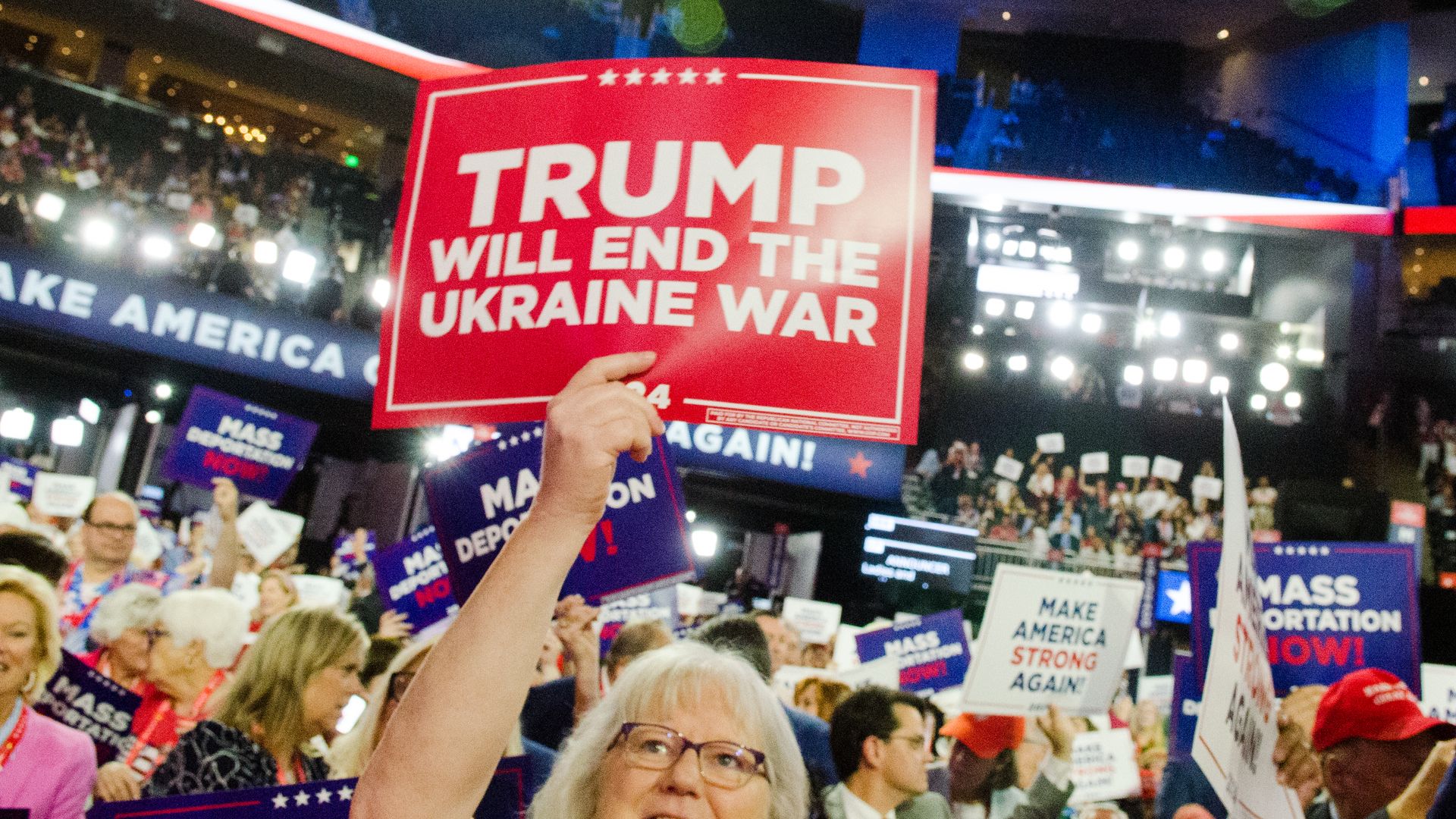
[RYAN ROBERTSON]
IN NOVEMBER, AMERICANS WILL DECIDE WHO WILL LEAD THE UNITED STATES FOR THE NEXT FOUR YEARS. IT’S A DECISION THAT WILL OBVIOUSLY HAVE A HUGE IMPACT ON THE WORLD STAGE, INCLUDING CURRENT AND POTENTIAL WARS LIKE UKRAINE, GAZA, AND EVEN THE INDOPACIFIC.
Siegel: It is important to remember that, you know, there are serious, destructive forces out there. The British are calling it the ‘Quartet of Death.’ So that’s Russia, China, Iran and North Korea. The ‘Quartet of Death.’ And that’s a strategic point of view that we shouldn’t forget. You know, the United States will be secure if other parts of the world are secure. And if we do it in a smart way, and do it together, that’s probably the best way on the road ahead.
[RYAN ROBERTSON]
DAVID SIEGEL RUNS ELNET-US, THE LEADING ISRAELI ADVOCACY GROUP IN EUROPE, ISRAEL AND THE UNITED STATES. HE SAYS RIGHT NOW, ISRAEL IS IN A SECOND WAR FOR ITS INDEPENDENCE–ESSENTIALLY FIGHTING IRAN AND ITS PROXIES ON MULTIPLE FRONTS. IT’S IN THE INTERESTS OF THE UNITED STATES TO KEEP IRAN FROM GROWING TOO POWERFUL. SO, WHETHER IT’S BIDEN OR TRUMP WHO COMES OUT ON TOP IN NOVEMBER, SIEGEL SAYS HE EXPECTS THE RELATIONSHIP BETWEEN THE US AND ISRAEL TO REMAIN STRONG.
Siegel The stronger Israel is, the stronger we get the Europeans to become. And the stronger that relationship is, it will enable the United States to have the tools that it needs to operate in other theaters in a world, you know, say the Far East. So, you know, the Trump-Vance, you know approach to the world is not dissimilar than the approach that we see, because the world is changing. The United States is not the sole policeman anymore.
[RYAN ROBERTSON]
FOR OTHERS, THE DECISION IS MORE BINARY. MARK TEMNYCKY IS A NON-RESIDENT FELLOW AT THE ATLANTIC COUNCIL’S EURASIA CENTER. HIS GRANDPARENTS CAME TO THE UNITED STATES FROM UKRAINE IN THE 1950s, BUT HE STILL HAS FAMILY THERE. HE SAYS IN HIS MIND, AND IN THE MINDS OF MOST OF THE UKRAINIANS HE TALKS TO, A TRUMP-VANCE ADMINISTRATION IS NOT THE IDEAL OUTCOME IN NOVEMBER.
TEMNYCKY SAYS THAT ASSESSMENT IS BASED ON PRIOR EVENTS. LIKE IN 2016, WHEN THEN CANDIDATE TRUMP WAS RUNNING AGAINST HILARY CLINTON. TRUMP ACCUSED UKRAINE OF MEDDLING IN THE ELECTION, BUT THAT WAS SOMETHING THE FBI AND DOJ SAID RUSSIA ACTUALLY DID.
Temnycky: Then of course, there was the infamous scandal in 2019-2020 where President Zelensky and President Trump spoke together and President Trump withheld aid and defensive systems to Ukraine. In exchange, he wanted information about the Biden family. And more recently, when he has been talking about President Putin, he has said that President Putin is a ‘strong leader,’ and that he wants to end the war as quickly as possible.
[RYAN ROBERTSON]
TEMNYCKY SAYS ENDING THE WAR IN 24 HOURS, AS FORMER PRESIDENT TRUMP PROPOSED, WOULD MEAN LEAVING LARGE SWATHS OF EASTERN AND SOUTHERN UKRAINE–AND MILLIONS OF PEOPLE– UNDER THE CONTROL OF A RUSSIAN REGIME THAT CURRENTLY STANDS ACCUSED OF THOUSANDS OF WAR CRIMES AGAINST THE UKRAINIAN PEOPLE.
Temnycky: So, I think based on previous track record in his first term as President, I think that things should be taken as he says; at face value. Similarly, Senator Vance has been an opponent of Ukraine. He had said that he’s not interested or cares about what happens in Ukraine. In addition, he has voted against Ukraine aid on several occasions when Congress has voted on assistance efforts.
[RYAN ROBERTSON]
SENATOR VANCE IS ON ON THE RECORD SAYING BEFORE AND AFTER THE WAR STARTED THAT HE DOESN’T REALLY CARE WHAT HAPPENS IN UKRAINE, TELLING STEVEN BANNON IN MARCH 2022 HE WAS MORE CONCERNED ABOUT HIS YOUNG CHILD INTERACTING WITH CHILD SEX A TRAFFICKER.
VANCE IS ONE OF THE MOST VOCAL CRITICS IN CONGRESS OF AID TO UKRAINE.
HE PENNED AN OP-ED IN THE NEW YORK TIMES IN APRIL SAYING THE UNITED STATES FUNDAMENTALLY CAN’T PRODUCE ALL THE WEAPONRY UKRAINE WOULD NEED TO WIN THE WAR.
BUT, AS VICE PRESIDENT VANCE WOULDN’T NECESSARILY BE MAKING THE FINAL DECISIONS ON U.S. AID TO UKRAINE. AND AS SIEGEL IS QUICK TO POINT OUT, THERE ARE MECHANISMS IN PLACE FOR CONGRESS TO SEND AID TO UKRAINE–REGARDLESS OF WHO HOLDS THE OFFICE OF PRESIDENT.
Siegel: I don’t think these choices are binary. You know, there’s positives and negatives in every administration. There are pros and cons. You know, foreign policy is very complicated.
[RYAN ROBERTSON]
IF AMERICA DECIDES A TRUMP-VANCE WHITE HOUSE IS WHAT’S BEST FOR THE COUNTRY, AND THAT MEANS LESS U.S. AID TO UKRAINE, SIEGEL SAYS THAT COULD CREATE OTHER OPPORTUNITIES FOR AMERICAN ALLIES TO WORK TOGETHER MORE DIRECTLY–WITH THE SUPPORT AND DIRECTION OF THE UNITED STATES, BUT NOT AS RELIANT ON THE AMERICANS FOR THE HEAVY LIFTING. LIKE AN ALLIANCE ON AIR DEFENSE USING ISRAELI WEAPONS TO PROTECT MORE EUROPEAN COUNTRIES.
Siegel: To have those systems integrated between Europe, Israel, and that alliance that will enable the United States to have more flexibility, not to cold turkey withdrawal from Europe. I don’t think anyone is really talking about that. But to gradually encourage, you know, allies to take more on, more burden on themselves so that the United States has more wherewithal to focus on other areas of tension, conflict and threats such as, as the Far East and Taiwan. That’s a responsible, measured, balanced strategy that we very much believe in and, you know, we think that this is what, you know, the Trump folks are talking about.
[RYAN ROBERTSON]
SIEGEL SAYS A TRUMP-VANCE WHITE HOUSE DOESN’T NECESSARILY MEAN UKRAINE WOULD FALL OR LOSE THE WAR, BUT IT WOULD MEAN EUROPEAN NATIONS ALLIED WITH THE U.S. SHOULD BE READY TO BEAR MORE OF THE BURDEN TO KEEP THE INTERNATIONAL RULES BASED ORDER AFLOAT.
FOR STRAIGHT ARROW NEWS, I’M RYAN ROBERTSON. FOR MORE NEWS ABOUT THE ELECTION, OR TO SEE MORE OF OUR REPORTING ON THE WARS IN UKRAINE AND GAZA YOU CAN LOG ON TO SAN.COM, OR DOWNLOAD THE STRAIGHT ARROW NEWS APP TODAY.











